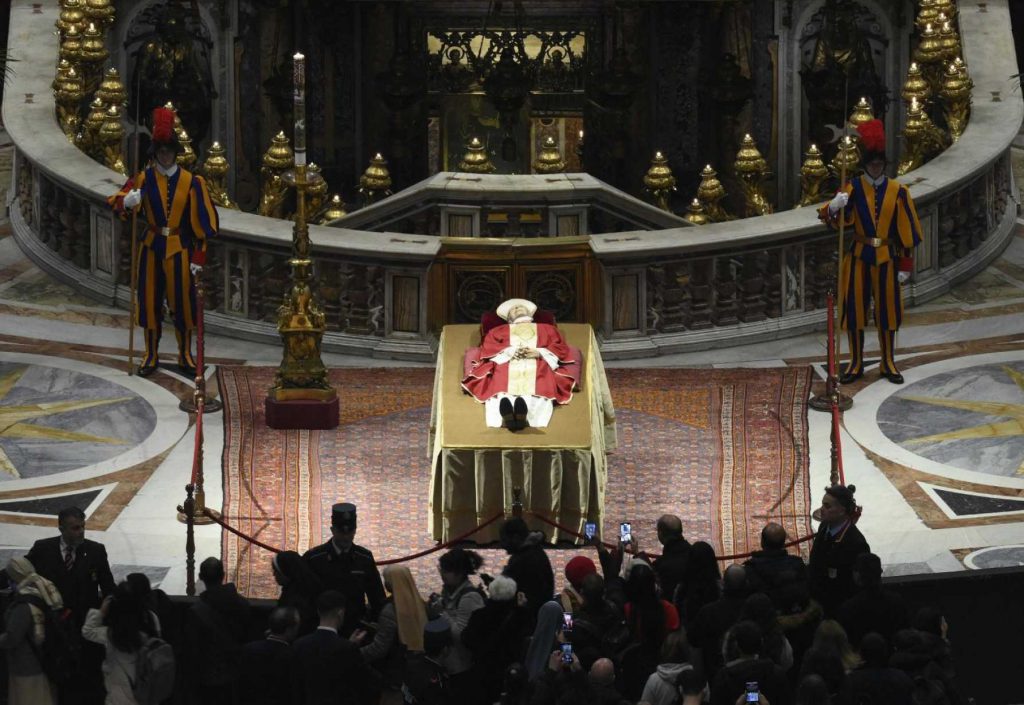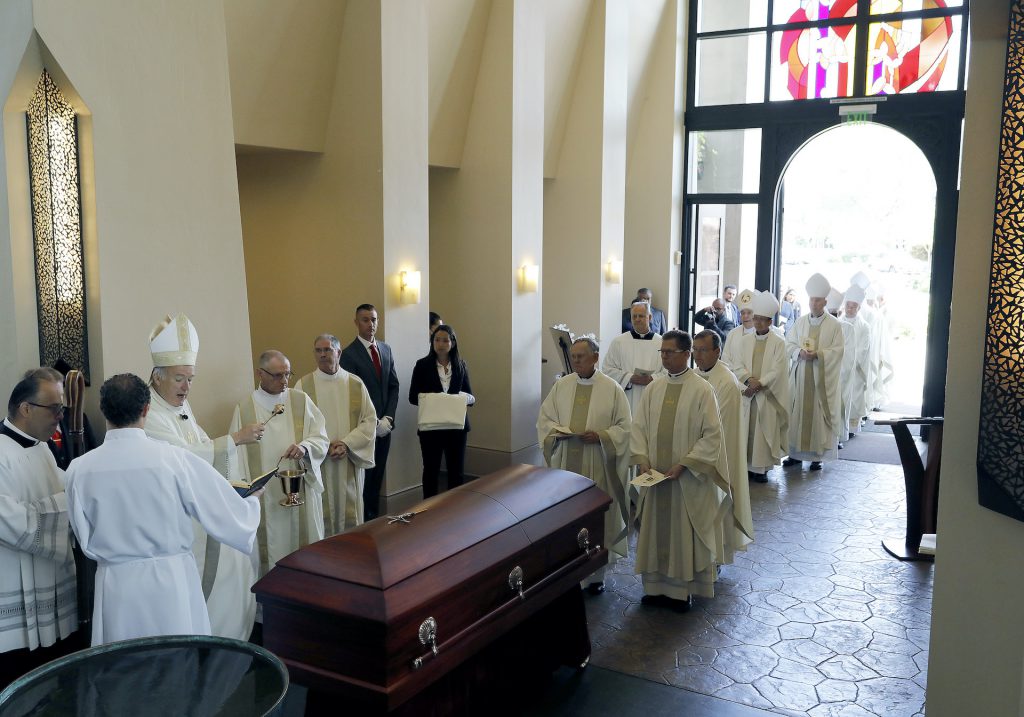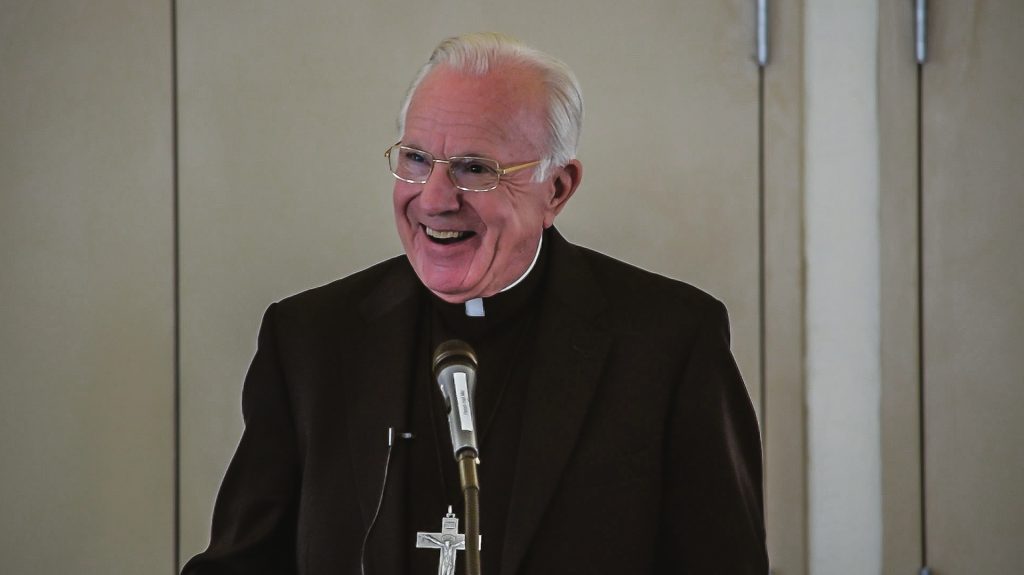SAN DIEGO — The Diocese of San Diego is mourning the loss and celebrating the legacy of its fourth bishop, Robert Brom, who died in his home May 9 at age 83.
“Bishop Brom was pastor, teacher and servant leader of the Catholic community in San Diego and Imperial counties for 23 years,” said Bishop Robert McElroy.
He said, “Bishop Brom’s deep love for our parishes and pastoral vision were complemented by a keen administrative capability in guiding San Diego through years of joy and hardship.”
Bishop McElroy presided over the late bishop’s funeral Mass on May 17 at St. Théresè of Carmel Church in Carmel Valley. It was concelebrated by several bishops, including Archbishop José Gomez of Los Angeles, Archbishop and former San Diego Auxiliary Bishop Salvatore Cordileone of San Francisco, and Bishop Kevin Vann of Orange, as well as San Diego’s own auxiliaries, Bishops John Dolan and Ramón Bejarano.
“We know that Bob Brom lived in the light of faith,” Bishop McElroy said shortly after the Mass began. “He was a pastor who cared for the souls with whom he was entrusted. He was a shepherd who labored ardently to tend to the flock. He was a teacher at heart, seeking to bring the Good News of the Gospel of Jesus Christ to those who had heard it before, to those who needed to hear it anew, and to those who had never heard it at all. He was a leader of this diocese on so many levels.”
Msgr. Steven Callahan, pastor of St. Brigid Parish in Pacific Beach, worked alongside Bishop Brom for years. As the homilist, he recalled that, after his first meeting with the late bishop, he recognized him as a man who “knows who he is, and where he’s going, and what he’s about, and what his mission is.”
He shared some favorite expressions of Bishop Brom’s, including “The Church either thrives in its parishes or it does not thrive at all,” “You shape your environment and your environment will shape you,” and “If Heaven’s so great, why wait?”
Of the latter, he said, “He meant it. It wasn’t a joke. … There was a longing in Robert Brom’s heart for the freedom of the children of God, awaiting – in the words of the Book of Revelation – a new heaven and a new earth. And while there’s definitely sadness in our hearts that he cannot be with us in the body, those are overtaken by our feelings of joy for him and the communion he now shares with our loving God, what he experiences, the glorious freedom of the children of God.”
The legacy of Bishop Brom, who retired in September 2013, includes the construction of many local churches and two high schools.
In his homily, Msgr. Callahan quipped that, “if Bishop Brom had not been a bishop, he could’ve made a fortune as a designer.” He noted the “meticulous care” with which Bishop Brom had approached the construction and renovation of parish and diocesan properties.
“He wanted people who use these places, whether for worship, or formation, or education, or ministry, to experience them as God’s dwelling place, where people could experience God dwelling with us.”
Bishop Brom led the diocese when the sex abuse scandal reached the local Church.
“Jesus in the Gospel tells Peter that, later in life, he’s going to be led where he doesn’t want to go,” said Msgr. Callahan. “That became a reality for Bishop Brom when the sex-abuse scandal began to break in 2002. He was led by the Lord where he would rather not go, and he responded as a shepherd,” accompanying victims and helping “all of us to grapple with the enormity of this scandal and the harm it did to the Church and to the victims.”
Under Bishop Brom’s leadership, in late 2007, the diocese reached an almost $200-million settlement for sex abuse committed by diocesan clergy.
Even before the magnitude of abuse claims became apparent, Bishop Brom began implementing policies to prevent sexual abuse and to maintain a safe environment for children and young people.
Retirement liberated him from the heavy responsibility of running a diocese, and he eagerly devoted himself to delivering presentations on the faith.
Narciso Guzmán served as Bishop Brom’s assistant for the past 21 years, helping him at his private daily Masses and with personal errands. He said the late bishop had to stop giving presentations in recent years as standing for extended periods was too much for his legs.
In retirement, Bishop Brom continued to make time for the Catholic inmates at Richard J. Donovan Correctional Facility in Otay Mesa, where he celebrated Easter Masses and heard confessions.
David Brom, the youngest of the five Brom siblings, believes that prison ministry was what the bishop found most fulfilling in his retirement.
“He deeply valued the time that he spent with the inmates, and they valued the time that they could spend with him,” he said. “One of the things of which he was proudest in retirement was cards of appreciation that were signed by all the inmates for the time that he spent there with them.”
Bishop Brom also continued his connection with the Missionaries of Charity. In the early 1990s, he accompanied Mother Teresa in her search to establish a convent in the San Diego Diocese. He celebrated the convent’s first Mass in 1992 in the San Diego neighborhood of Southcrest, and, in March of 2017, celebrated a Mass at the sisters’ new 8,000-square-foot convent.
Robert Brom was born Sept. 18, 1938, in Arcadia, Wis., to Henry and Lucille Brom. In an interview that appeared in The Southern Cross on July 24, 1989, his mother recalled his youthful practice of pretending to celebrate Mass on the front porch of the family home.
He was ordained on Dec. 18, 1963, as a priest for the Diocese of Winona, Minn. He was appointed bishop of the Diocese of Duluth on March 25, 1983, by Pope St. John Paul II and was consecrated and installed on May 23, 1983.
His episcopal motto, taken from 1 Corinthians 1:12, is “Ego sum Christi,” which is Latin for “I belong to Christ.”
“I think there was a reluctance on his part to become a bishop, in part because he liked being among the people, he liked being a pastor, he liked communicating with the everyday Catholic and the everyday person,” recalled David Brom. “At the same time, he recognized that he had a gift and he could serve in that capacity and still be pastoral.”
After serving for six years as bishop of Duluth, Bishop Brom was appointed coadjutor bishop of San Diego on April 22, 1989, meaning that he would automatically succeed Bishop Leo Maher upon the latter’s retirement.
He became the fourth bishop of San Diego on July 10, 1990.
In that capacity, Bishop Brom made parish pastoral visits five times to all of the diocese’s approximately 100 parishes. David Brom said his brother frequently visited Catholics in the Imperial Valley, so much so that he was sometimes characterized as “the hermit bishop” because of the amount of time he spent in the desert.
Many of the parishes founded by Bishop Brom’s predecessors underwent major development during his years as diocesan bishop. This includes the construction of several new church buildings. When he retired, Our Lady of Mt. Carmel Parish in Rancho Peñasquitos was nearing the end of construction on its new church.
Bishop Brom also oversaw the development of two new high schools. Cathedral Catholic High School, which carries on the legacy and traditions of the University of San Diego High School, opened in 2005 in Carmel Valley. Mater Dei Catholic High School, a successor to Marian Catholic High School, opened in 2007 in Chula Vista.
From the beginning of his ministry in San Diego, Bishop Brom believed that the diocese’s many ethnic and cultural groups enriched the Local Church. At a press conference on the day he became San Diego’s bishop, he expressed his desire that the cultural groups receive “a proportionate amount of our attention and resources with additional services.”
With the authorization of Bishop Brom, the diocesan Office for Cultural Diversity was established. The office serves communities representing African American, Chinese, Filipino, Spanish-speaking and Vietnamese Catholics, among others. And it was Bishop Brom who upgraded the Ecumenical Commission to a diocesan office and became the first bishop in the country to appoint a vicar for ecumenical and interreligious affairs.
“When you start something, you don’t see the fruit maybe until later,” said Guzmán, reflecting on how multicultural events like the fifth annual Pentecost Mass for All Peoples, scheduled for June 4 at Cathedral Catholic High School, can be seen as the result of seeds that Bishop Brom planted.
Guzmán recalled Bishop Brom as a humble man.
“Even though he was a bishop, he was not … walking in the sky,” he said. “He always wanted Christ to be the one who shines, not him.”
A gallery of photos from Bishop Brom’s funeral Mass is available at thesoutherncross.org/brom






